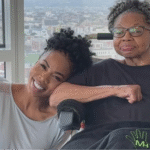This article was written by Kris Bailey, professional international doula and NOWINCLUDED community member
Giving birth and bringing a new life into this world can be a wonderful experience. Unfortunately, for Black women, it can also be a traumatic, or even fatal, experience, as they are three times more likely to experience pregnancy-related complications leading to death compared to white women, irrespective of their income or education.1
Black Maternal Health Week is a week-long campaign founded by the Black Mamas Matter Alliance, with the goal of building awareness, activism, and community-building to amplify the voices, perspectives, and lived experiences of Black birthing families. The theme of 2023’s Black Maternal Health Week (April 11-17) is “Our Bodies Belong to Us: Restoring Black Autonomy and Joy!”
As a full-time, full-spectrum birth and postpartum doula and parent coach who has been practicing since 2014, I find this year’s theme to be extremely relevant, as we need a new narrative around Black birthing people.
Our birth stories should not have trigger warnings. Our birth stories should be uncensored testimonies of safe deliveries and healthy birthing environments.
Black birthing families deserve so much more – they deserve their pain to be taken seriously, they deserve to give birth without bias, and most importantly, they deserve not to have the looming fear of losing their life during childbirth. Black people deserve to birth peacefully knowing that they are capable, that birth is a natural occurrence, that they are fully supported and safe. Black birthing people deserve joy to be restored in their pregnancy and birth stories.
One way to increase your chances of having a positive birth experience is by including a doula in your birth team. A doula is a trained professional who provides emotional, physical, and informational support to a woman and her partner before, during, and after childbirth.
While doulas do not deliver babies or provide medical care, the support role of a doula is extensive, customizable, and undeniably beneficial. A 2013 study published by the American Journal of Public Health found that women who had continuous support from a doula during labor were 39% less likely to have a cesarean section compared to women who did not have a doula.2
Below are five ways a doula can help you during pregnancy and childbirth.
- During your pregnancy, your doula can help you prepare your body and mind for the big day. Doulas can provide information that normalizes the process of childbirth, help identify birthing options, and teach you pain management techniques. Your doula can also provide you with tools to advocate for yourself during prenatal sessions with your primary care provider.
- During labor, your doula can be an extra pair of eyes and ears, which can reduce fear and anxiety and allow you and your partner to be fully present in the birthing process. Your doula will focus on you and walk you through the process in real time. Experienced doulas can help you get into different positions for each stage of labor, identify when something is “off,” and help you navigate making decisions that can directly impact the outcome of your birth decisions.
- Whether you’re giving birth at home or hospital, medicated or breathing and moving through your contractions, your doula is your cheerleader! Your doula will encourage you when it feels tough, remind you of your strength and power, and help you stay calm.
- Doulas can take a huge mental load off you and your partner regardless of birthing location. Your doula can come to you at home, time contractions, think ahead about traffic and weather conditions that may impact your trip to your birthing location, and be with you until it’s time to go. If need be, your doula can also guide you through the induction process and help you decrease your risk of “stalled labor” and c-sections.
- In case you don’t have the birth experience you desired, your doula can help set up a support team for you, which may include local maternal and infant health providers, mental health specialists, pelvic floor therapists, parent support groups, and more. Your birth doula can work with you during your immediate postpartum and guide you into parenthood.
For more information around birth doula care and postpartum services, visit: https://birthandbabyservices.com/
For affordable access to doulas, check out:
- https://everymothercounts.org/choicesinchildbirth/resources/finding-affordable-or-free-doula-support/
- https://www.returningtobirth.com/blog/how-to-get-a-free-or-low-cost-doula
- https://radicaldoula.com/becoming-a-doula/volunteer-programs/
- https://www.birthcompany.com/volunteer-doulas.html
- https://www.dove.com/us/en/baby/black-birth-equity-fund-application.html
- Note: NOWINCLUDED is not affiliated with any of the organizations listed above.
References:
- Kennedy-Moulton, Kate, et al. “Maternal and Infant Health Inequality: New Evidence from Linked Administrative Data.” National Bureau of Economic Research, 28 Nov. 2022, https://www.nber.org/papers/w30693.
- Kozhimannil, Katy B., et al. “Doula Care, Birth Outcomes, and Costs Among Medicaid Beneficiaries.” American Journal of Public Health, vol. 103, no. 4, American Public Health Association, Mar. 2013, pp. e113–21. https://doi.org/10.2105/ajph.2012.301201.








